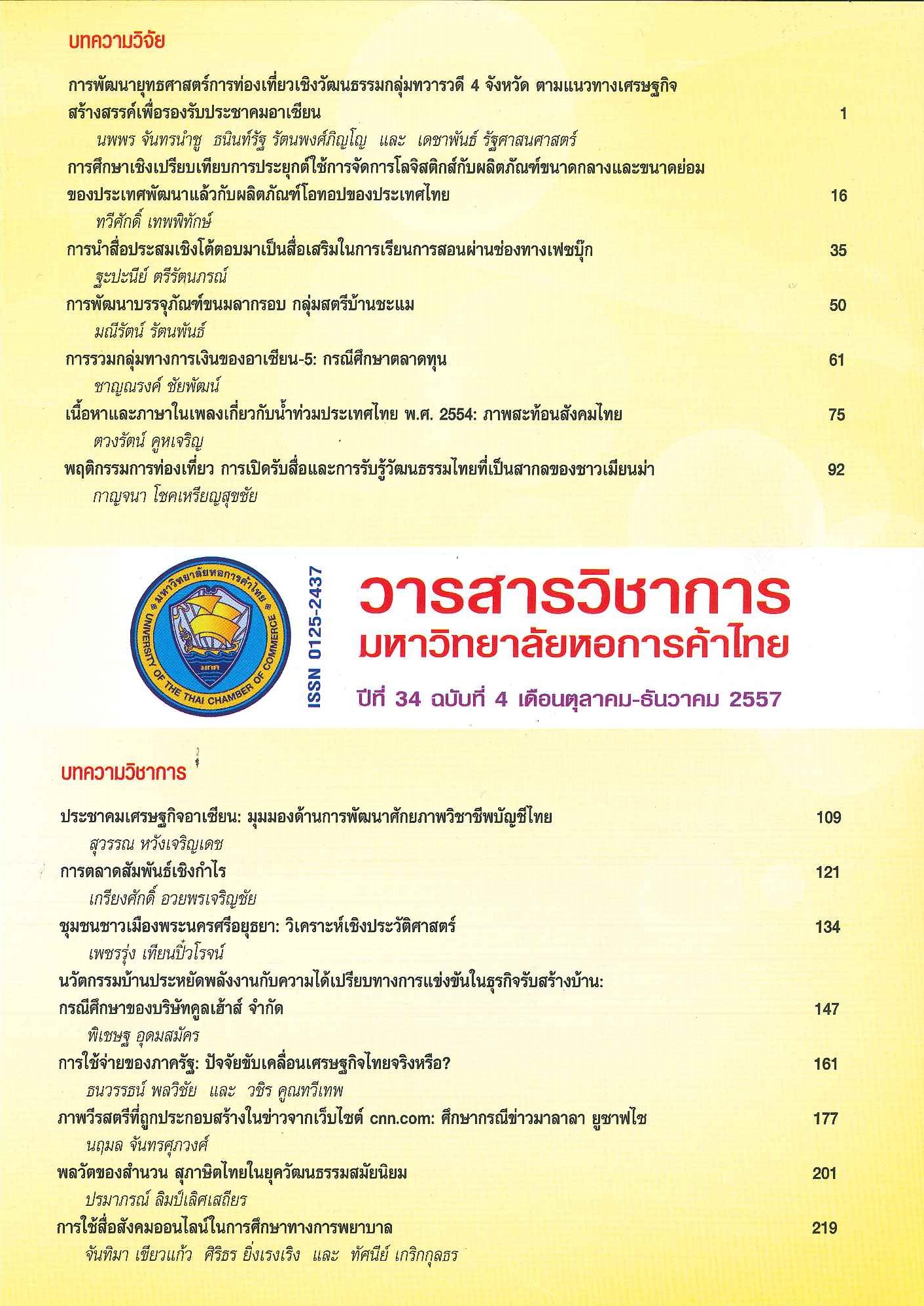A Comparative Study of Applying Logistics Management in Developed Countries and Thai OTOP SME Products
Main Article Content
Abstract
After Thailand confronted the economic crisis in 1997, the Thai government initiated the establishment of a project called “one tambon, one product, or OTOP”. The objective was to encourage and boost economic growth. However, to build a competitive advantage, OTOP firms need to produce high quality goods at low costs and provide quicker delivery services which meet the customer’s expectation by adopting logistics techniques. The literature reveals that foreign SME firms apply logistics efficiently in their functions, whereas Thai firms ignore the application of logistics techniques. Furthermore, some government sectors have not adopted logistics techniques and strategies sufficiently. The objective of this paper is to study issues related to the application of logistics in OTOP firms compared to those in developed countries, and to build and develop knowledge bodies in this area. The study surveys secondary sources (i.e. academic journals, books, texts) related to the OTOP research studies and logistics and supply chain. It studies the patterns, approaches and direction of success and failure of studied projects to find a way to improve the competitive advantage of OTOP products. In-depth interviews are used to collect data from government sectors and Japanese and Australian firms, including using observation and field study to survey foreign firms.
Article Details
ลิขสิทธิ์ของบทความ
ผลงานที่ได้รับการตีพิมพ์ถือเป็นลิขสิทธิ์ของมหาวิทยาลัยหอการค้าไทย ห้ามมิให้นำเนื้อหา ทัศนะ หรือข้อคิดเห็นใด ๆ ของผลงานไปทำซ้ำ ดัดแปลง หรือเผยแพร่ ไม่ว่าทั้งหมดหรือบางส่วนโดยไม่ได้รับอนุญาตเป็นลายลักษณ์อักษรจากมหาวิทยาลัยหอการค้าไทยก่อน
References
Azuma, N. 2002. "Pronto Moda Tokyo-Style – Emergence of Collection-Free Street Fashion in Tokyo and the Seoul-Tokyo Fashion Connection." International Journal of Retail and Distribution Management 30, 3: 137-144.
Chan, J. W. K., Burns, N. D., and Yung, K. L. 2000. "Environment-Strategy Fit: A Study of Hong Kong Manufacturing Logistics." Logistics Information Management 13: 65-79.
Gunasekaran, A. and Ngai, E. W. T. 2003. "The Successful Management of a Small Logistics Company." International Journal of Physical Distribution and Logistics Management 33, 9: 1-24.
Morrissey, B. and Pittaway, L. 2004. "A Study of Procurement Behavior in Small Firms." Journal of Small Business and Enterprise Development 11, 2: 27-45.
Panpetch, Niyada. 2013. Promoting OTOP Products to OTOP City 2013. Bangkok: PR Technical Relations Office, Government Public Relations Department. (in Thai).
นิยะดา พันธุ์เพ็ชร. 2556. การส่งเสริมผลิตภัณฑ์โอทอปสู่ OTOP City 2013. กรุงเทพมหานคร: สำนักพัฒนาการประชาสัมพันธ์ กรมประชาสัมพันธ์.
Pushing OTOP Products to World Market. 2011. Bangkok: Thai Tambon. (in Thai).
ผลักดันผลิตภัณฑ์โอทอปสู่ตลาดโลก. 2554. กรุงเทพมหานคร: ไทยตำบล.
Quayle, M. 2003. "A Study of Supply Chain Management Practice in UK Industrial SMEs." Supply Chain Management: An International Journal 8, 1: 79-86.
Seeley, I. Smith, G. and Lanham, J. 2000. "Issues Faced by SME’s Considering Overseas Manufacture in Manufacturing Information Systems." In Proceedings of the Fourth SME International Conference, pp. 48-63. Cape Town: South Africa.
Sum, C., Kow, L. S. and Chen, C. 2004. "A Taxonomy of Operations Strategies of High Performing Small and Medium Enterprises in Singapore." International Journal of Operations and Production Management 24, 3: 72-87.
Thailand. Community Development Department. 2010. OTOP Village for Tourism. Bangkok: Community Development Department Publishing. (in Thai).
กรมการพัฒนาชุมชน. 2553. หมู่บ้านโอทอปเพื่อการท่องเที่ยว. กรุงเทพมหานคร: กรมการพัฒนาชุมชน.

